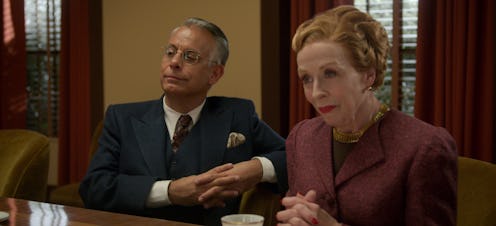
Ryan Murphy's Hollywood follows several young creatives as they try to make it big in Hollywood, and Ace Studios is where their careers all intersect. It's there that Raymond is directing Archie's script about Peg Entwistle, and it's there that Camille and Jack are training to be stars. Unlike some of the characters in the show, Hollywood's Ace Studios isn't real, but it is a sort of amalgam for established studios like Metro-Goldwyn-Mayer (MGM) Studios and Universal Pictures (though there's also a real acting studio in Los Angeles by the same name).
There are references sprinkled throughout Hollywood's early episodes that hint at Ace Studios' real-life parallels. During a conversation with Jack in Episode 2, Avis reveals that she's the wife of the head of Ace Studios. Not only is the three-letter acronym and thin lettering of Ace's logo reminiscent of MGM, but Murphy told The Hollywood Reporter that Avis is very loosely based on real-life producer Irene Mayer Selznick, who was the daughter of MGM Studio head Louis B. Mayer (and wife of producer David O. Selznick). It's safe to assume, then, that Ace is modeled at least in part after MGM.
Later on, Jack (very poorly) screen tests for an Ace Studios film called Tap Roots, which was a real civil war film created by Universal Pictures in 1948. MGM is also name-checked by Ace's Ellen Kincaid as her prior employer, suggesting that in Hollywood, Ace Studios is the more desirable place to be.
And she's right: in Murphy's revisionist version of Hollywood, Ace is the place where all the marginalized creatives from history get the opportunities they were never afforded in real life. During a conversation with Raymond, for example, studio executive Richard explains that he was there during Anna May Wong's screen test for The Good Earth, MGM's real 1937 film about struggling Chinese farmers. Richard says Wong was by far the best actor for the lead, but the role ultimately went to white actress Luise Rainer, who won an Oscar for the part. In Hollywood, Wong also loses out to Rainer, but Ace represents a chance for her to star in her own film, perhaps Raymond's Angel of Shanghai.
Opportunities also arise for Camille and Avis. Camille is forced to play a stereotypical Black maid in a film, but Ace casts her as the lead in Raymond's Meg — making her the first Black woman to star in a major motion picture. Similarly, the Jewish Avis tells Jack that she was a silent era movie star until studio heads told her she was too "ethnic" for the talkies. Just like how Irene Mayer Selznick became a theater producer, Avis eventually inherits Ace Studios, and she makes a series of groundbreaking decisions that end up propelling Hollywood's protagonists into the spotlight.
Ace Studios may be a fictional dreamland, but in an optimistic retelling of the Golden Age of Hollywood, that's entirely the point.